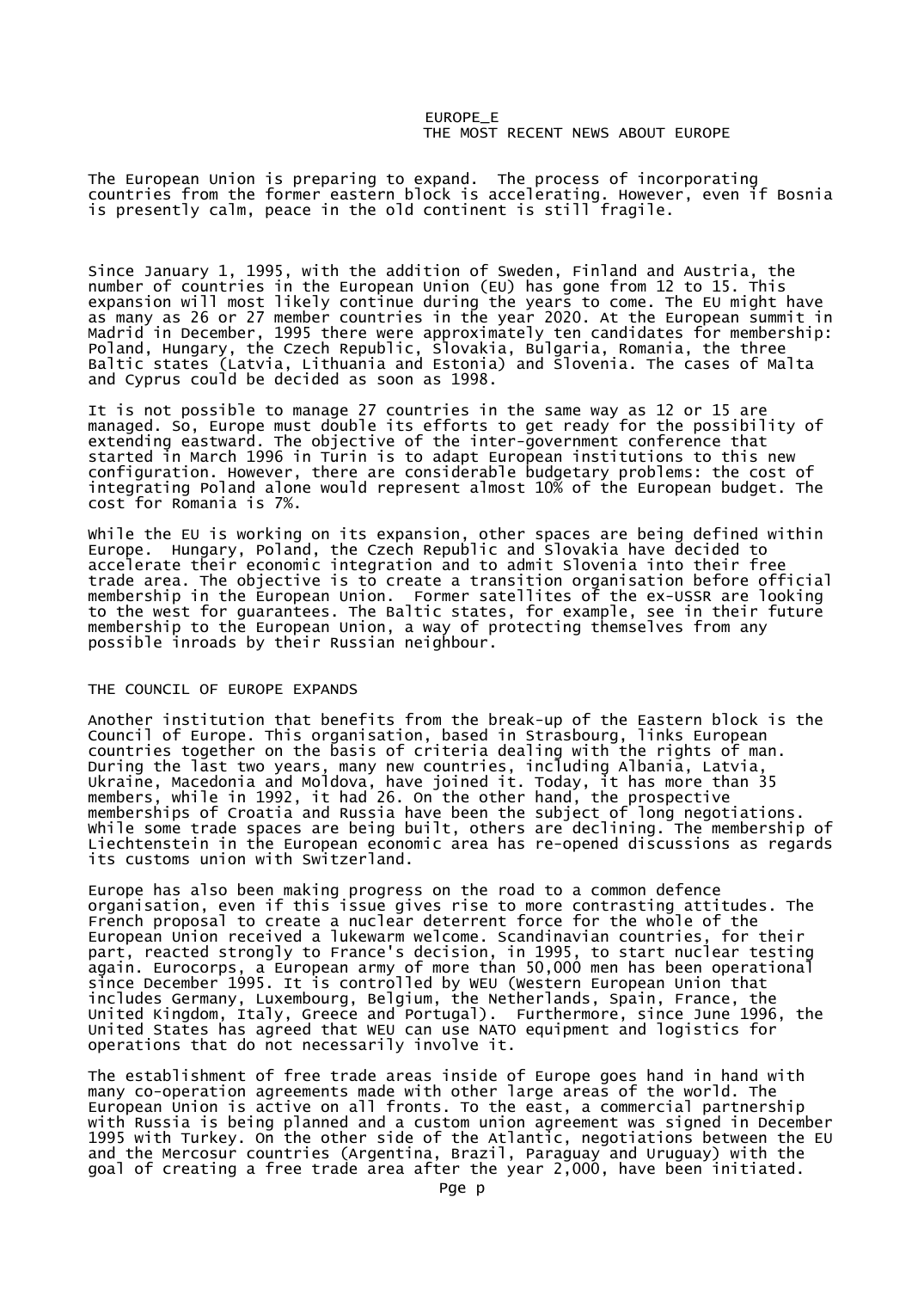EUROPE_ETHE MOST RECENT NEWS ABOUT EUROPEThe European Union is preparing to expand.
Publié le 23/05/2020

Extrait du document
«
EUROPE_ETHE MOST RECENT NEWS ABOUT EUROPE
The European Union is preparing to expand.
The process of incorporatingcountries from the former eastern block is accelerating.
However, even if Bosniais presently calm, peace in the old continent is still fragile.
Since January 1, 1995, with the addition of Sweden, Finland and Austria, thenumber of countries in the European Union (EU) has gone from 12 to 15.
Thisexpansion will most likely continue during the years to come.
The EU might haveas many as 26 or 27 member countries in the year 2020.
At the European summit inMadrid in December, 1995 there were approximately ten candidates for membership:Poland, Hungary, the Czech Republic, Slovakia, Bulgaria, Romania, the threeBaltic states (Latvia, Lithuania and Estonia) and Slovenia.
The cases of Maltaand Cyprus could be decided as soon as 1998.
It is not possible to manage 27 countries in the same way as 12 or 15 aremanaged.
So, Europe must double its efforts to get ready for the possibility ofextending eastward.
The objective of the inter-government conference thatstarted in March 1996 in Turin is to adapt European institutions to this newconfiguration.
However, there are considerable budgetary problems: the cost ofintegrating Poland alone would represent almost 10% of the European budget.
Thecost for Romania is 7%.
While the EU is working on its expansion, other spaces are being defined withinEurope.
Hungary, Poland, the Czech Republic and Slovakia have decided toaccelerate their economic integration and to admit Slovenia into their freetrade area.
The objective is to create a transition organisation before officialmembership in the European Union.
Former satellites of the ex-USSR are lookingto the west for guarantees.
The Baltic states, for example, see in their futuremembership to the European Union, a way of protecting themselves from anypossible inroads by their Russian neighbour.
THE COUNCIL OF EUROPE EXPANDS
Another institution that benefits from the break-up of the Eastern block is theCouncil of Europe.
This organisation, based in Strasbourg, links Europeancountries together on the basis of criteria dealing with the rights of man.During the last two years, many new countries, including Albania, Latvia,Ukraine, Macedonia and Moldova, have joined it.
Today, it has more than 35members, while in 1992, it had 26.
On the other hand, the prospectivememberships of Croatia and Russia have been the subject of long negotiations.While some trade spaces are being built, others are declining.
The membership ofLiechtenstein in the European economic area has re-opened discussions as regardsits customs union with Switzerland.
Europe has also been making progress on the road to a common defenceorganisation, even if this issue gives rise to more contrasting attitudes.
TheFrench proposal to create a nuclear deterrent force for the whole of theEuropean Union received a lukewarm welcome.
Scandinavian countries, for theirpart, reacted strongly to France's decision, in 1995, to start nuclear testingagain.
Eurocorps, a European army of more than 50,000 men has been operationalsince December 1995.
It is controlled by WEU (Western European Union thatincludes Germany, Luxembourg, Belgium, the Netherlands, Spain, France, theUnited Kingdom, Italy, Greece and Portugal).
Furthermore, since June 1996, theUnited States has agreed that WEU can use NATO equipment and logistics foroperations that do not necessarily involve it.
The establishment of free trade areas inside of Europe goes hand in hand withmany co-operation agreements made with other large areas of the world.
TheEuropean Union is active on all fronts.
To the east, a commercial partnershipwith Russia is being planned and a custom union agreement was signed in December1995 with Turkey.
On the other side of the Atlantic, negotiations between the EUand the Mercosur countries (Argentina, Brazil, Paraguay and Uruguay) with thegoal of creating a free trade area after the year 2,000, have been initiated.
Pge p.
»
↓↓↓ APERÇU DU DOCUMENT ↓↓↓
Liens utiles
- A member of the European Union since 1986, it is one of the poorestcountries in Western Europe, but rapid changes and strong growth areensuring that Portugal is gradually catching up.
- A member of the European Union, the Netherlands are the leading countryfor producing and exporting natural gas in Europe.
- The European Union, of which it has been a member since 1981, has justimposed an austerity plan on Greece.
- Denmark's prosperity depends on its trade with the European Union whichrepresents half of its exports.
- A member of the European Union, the Grand Duchy of Luxembourg is one ofthe Union's six founder countries.


